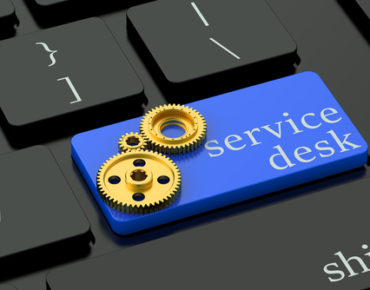Service Desks and the Approaching AI Tipping Point

New versions of service management software are getting an AI boost. But while customers and end users expect companies to retain their hardware, software and access configurations and requirements, they also still want one-on-one service from analysts.
AI allows for the best of both worlds, combining human creativity with state-of-the-art technology. Its value lies in its ability to integrate with existing systems and make employees’ lives easier. Teams that utilize advanced digital tools such as AI can offer more consistent help to customers while taking advantage of the time and labor saving capabilities of AI to advance ongoing projects.
The Human-AI Partnership
Service desks are rapidly approaching an AI tipping point. While directors, managers, and supervisors know the technology is relevant and will become crucial to the modern business world, they also worry AI will make jobs disappear.
But that isn’t the whole truth of what is about to happen. Will some jobs be lost? Yes.
McKinsey Global Institute forecasted that the portion of jobs calling for “low digital skills” would fall from 40 percent to 30 percent as jobs requiring higher skills rise from 40 percent to 50 percent of the job market. It’s critical for enterprises to upskill teams and prepare them for the new normal, while at the same time ensuring that their data systems, knowledge management and infrastructure are capable of providing the underpinnings necessary for AI to be successfully used. All parties must understand AI’s role within the company and recognize the ways it impacts day-to-day workflows.
More importantly, this technical tool can help streamline support processes by collecting information and facilitating responses from customers before an analyst responds. That way, analysts understand the issue prior to getting on the phone or chat dialogue, and can focus solely on helping the user work through their issue. In many cases, support center contacts can be avoided entirely.
Smart, modern professionals who augment their performance with AI can offer customers and users personalized service around the clock using multiple communication channels. These interactions can be automatically logged in the service management tool, providing more information for future issues and questions.
Staff members with advanced technical expertise will take service support to a whole new level. Service desks that intelligently expand and scale up workforces will keep systems running smoothly and show that the human element is essential at every level of the business world. HDI research shows that 27 percent of support organizations were creating and filling new positions in 2019.
Upgrading the C-Suite
Cross-functional teams with varied skills and perspectives can use AI to develop new applications and create positive business impacts. To aid in this mission, more companies are hiring Chief Analytics Officers and Chief Data Scientists to reflect the fact that technical expertise is now a vital quality in the C-suite. Senior executives who understand AI at a higher level can identify and prioritize opportunities. Business and operations teams who work side by side with analytics experts will ensure company initiatives address broad organizational priorities, not just isolated issues.
Employees up and down the value chain need to augment their skill sets in similar ways. By combining their judgment and intuition with algorithmic recommendations they will arrive at more informed conclusions than humans or machines could reach on their own.
Connecting to Help the Enterprise
Service desks often align IT success measures with business outcomes, which means putting human ingenuity and technological innovation together is an especially smart approach. Modern enterprises need to perform frequent updates while ensuring systems stay online and available. As part of this endeavor, they may use AI to keep internal and external lines of communication open, stable and secure.
In a contemporary service desk, analysts need to connect in a clear, accurate and timely manner, often with desktop support or field operations technicians who may have to travel to the deskside when remote assistance isn’t enough. Large enterprises often face complex communication issues because of siloed processes. But thanks to new communication technologies, supervisors can track employees and get in touch with them immediately.
Service desks that add AI to their customer support system will likely face a learning curve, and they may not get an immediate payoff from this technology. But HDI’s research tells us that 59 percent of users and 83 percent of analysts are willing to use AI-powered knowledge management systems for self-service — one of AI’s prime applications — as long as they understand the benefits.
 Roy Atkinson is group principal analyst at Informa Tech with expertise in the service and support industry.
Roy Atkinson is group principal analyst at Informa Tech with expertise in the service and support industry.










